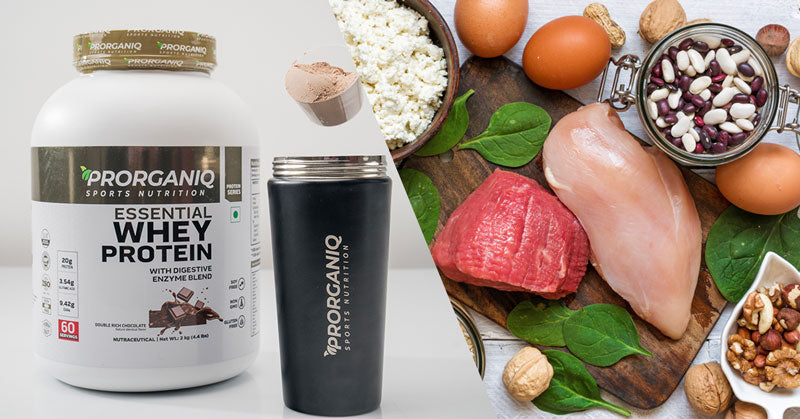7 Best Whey Protein Alternatives
For a big majority of weightlifters, athletes, gym-goers, and the health and diet-conscious among us, whey protein supplements are synonymous with protein.
7 Best Alternatives to Whey Protein
Explore 7 top whey protein alternatives including salmon, lentils, and Greek yogurt to diversify your diet and meet your nutritional goals effectively.
Salmon/ Tuna/ Shrimp
Oily fish such as tuna and salmon are high in Omega-3 fatty acids and high-quality lean protein. In fact, wild-caught and farm-raised salmon have almost the same amount of Omega-3 fatty acids as whey protein.
Salmon, tuna, and shrimp can be consumed once or twice a week. However, sharks, swordfish, king mackerel, or tilefish should be avoided as they tend to have a higher level of mercury.
If you want to go for tuna, it is best to opt for the “chunk light” tuna that is lower in mercury than other tuna varieties. Moreover, get it packed in water instead of oil so that less healthy and unnecessary fats can be avoided.
Lentils
A half-cup of lentils offers approximately 12 grams of protein. There is no denying the fact that lentils are not rich in all essential amino acids but you can create a complete protein source by combining it with brown rice. Lentils are rich in folate, niacin, iron, zinc, potassium, and phosphorus.
They are also rich in soluble fiber (8 grams per one-half cup), which is vital to a healthy digestive system.
It is worthwhile to remember here that lentils of all colors offer almost the same amount of protein but different types work well in different dishes.
Nuts & Seeds
Rich in high-quality omega 3 and omega 6 fatty acids, these plant-based protein sources are also high in protein and other essential nutrients.
Nuts and seeds may not be complete protein sources as they don't include all the nine essential amino acids but they do offer high-quality fats and complex carbs.
Moreover, both nuts and seeds go well with other sources of proteins. In addition to this, they are excellent choices for healthy, low-glycemic snacking.
- Almonds — 5.9 g protein per 1 oz serving
- Brazil nuts — 4 g protein per 1 oz serving
- Cashews — 5.1 g protein per 1 oz serving
- Chia seeds — 4.4 g protein per 1 oz serving
- Flax seeds — 5.1 g protein per 1 oz serving
- Hazelnuts — 4.2 g protein per 1 oz serving
- Macadamia nuts — 2.2 g protein per 1 oz. serving
- Pistachios — 6 g protein per 1 oz serving
- Pine nuts — 3.8 g protein per 1 oz. serving
- Pecans — 2.6 g protein per 1 oz. serving
- Pumpkin seeds — 5.2 g protein per 1 oz serving
- Sunflower seeds — 5.8 g protein per 1 oz serving
- Sesame seeds — 4.7 g protein per 1 oz serving
- Walnuts — 4.3 g protein per 1 oz serving
Eggs
The average egg offers 6-7 grams of high-quality protein while also providing all nine essential amino acids in the right ratios.
A fairly balanced and low-calorie source of almost every nutrient, eggs also promote the feeling of fullness that helps you maintain a healthy weight or lose weight.
Quinoa
Actually, a seed instead of a cereal grain, Quinoa has been a staple food item in South America for thousands of years. Its popularity in countries like the United States and India has only grown in the last few decades.
A one-cup serving of cooked quinoa offers 39 grams carbohydrates, 8 grams protein, 5 grams fiber, and 4 grams fat. The nutrient profile of quinoa includes manganese, magnesium, zinc, folate, among others that make it a great and healthier alternative to rice and other grains.
Greek Yogurt
Thicker than regular yogurt, Greek Yogurt offers about 17-20 grams of protein per 6- to 7-ounce serving. It also offers approximately 20 percent of your day's recommended daily intake of calcium.
Cottage Cheese
Cottage Cheese is rich in riboflavin, phosphorus, folate, calcium, vitamin B12, and other essential vitamins and minerals.
A one-cup serving of % milkfat cottage cheese offers 6.1 grams carbohydrates, 2.3 grams fat, 28 grams protein, and at least 30% of your day's recommended daily intake (RDI) of selenium.


